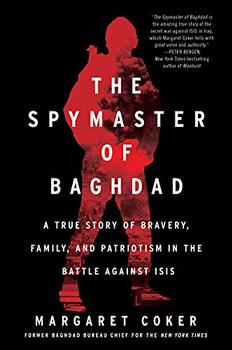Summary | Excerpt | Reading Guide | Reviews | Beyond the Book | Readalikes | Genres & Themes | Author Bio

A True Story of Bravery, Family, and Patriotism in the Battle against ISIS
by Margaret Coker
The al-Sudanis weren't the type of family to recite religious verses, but Abu Harith had a fierce moral streak. In his mind, alcohol was bad because it revealed a person to be unreliable, undependable, and weak, character flaws that would stain the whole family. Dating was the same. If teenage boys and girls spent too much time together unchaperoned, djinns would tag along. They would become wild, unpredictable, and deceitful. Order would be upended and the family's reputation ruined.
When Harith walked into his first class at university, Introduction to Engineering, and slipped into the tight, wooden desk, he wasn't prepared for the shock. Unlike school in Saddam City, the university was coed. Harith hadn't been in such close physical proximity to women his own age in years. He couldn't concentrate on anything the professor said. His nose was filled with flowery perfume wafting from the young woman sitting directly in front of him. She smelled of orange blossoms and laughed like an angel, her chestnut-colored hair shaking and catching the light as she tossed her head back.
Harith didn't know her name, but he knew he was in love. And he knew exactly how he would show it. When his classes were finished for the day, he went to Mutanabbi Street, Baghdad's famous street of booksellers, to buy thick, creamy paper and a calligraphy pen. He went home and wrote three masterpieces of intricately woven prose intending to woo the woman who had captivated his heart.
For three weeks, he came early to class and dropped a sealed letter on her desk. When she arrived, he watched surreptitiously while she picked up the missive and read his poems. Clearly curious, she would scan the room trying to determine who had left the notes. She never looked at Harith. On the fourth week, his final letter contained an ode by Nizar Qabbani, the famous modern Arab poet.
My Lover asks me:
What is the difference between me and the sky?
The difference, my love,
Is when you laugh
I forget about the sky.
At the bottom of the page Harith wrote a request to meet the following afternoon at the Abu Nuwas park along the banks of the Tigris River. It was time, he wrote, to introduce himself.
That night, anxiety kept him awake. Um Harith kept asking him if he was sick, mistaking his agitation. Harith felt like his every nerve was on fire, but he told her that everything was just fine.
Harith knew he was crossing several taboos by pursuing the woman from his class. During the four weeks of correspondence, Harith had cautiously asked about his classmate, Nisreen. Turns out, she wasn't Shiite. She wasn't even Arab. She was from a Kurdish family in Sulaymaniyah, a combination that, as far as his father was concerned, would make her as unsuitable a choice for his son as a chimpanzee.
For once, Harith ignored the nagging voice in his head, the voice of his father that he had always routinely obeyed. He told himself that if Nisreen came to their rendezvous, then she must be his destiny. Something his father couldn't interfere with, even if he tried.
The next afternoon, when Harith arrived at the park, Nisreen was already there. Her eyes widened when she saw him. Her parents had always told her that the residents of Saddam City were either radicals or animals. She had never suspected that poets lived there, too.
Harith had been afraid of being tongue-tied, but instead the words flowed out of him. He bought them pomegranate juice from a wooden stall near the July 14 Bridge. They talked about books and school and their families.
They promised to meet again, and again after that. Soon, his appointments with Nisreen took up more time than his schoolwork. His father complained that Harith was never home anymore, but the young man made up excuses about needing to study at the library in the evening, a good lie as it was not entirely untrue. In their home with ten rowdy children, he never had enough space or quiet to do that.
Excerpted from The Spymaster of Baghdad by Margaret Coker. Copyright © 2021 by Margaret Coker. Excerpted by permission of Dey Street Books. All rights reserved. No part of this excerpt may be reproduced or reprinted without permission in writing from the publisher.
Your guide toexceptional books
BookBrowse seeks out and recommends the best in contemporary fiction and nonfiction—books that not only engage and entertain but also deepen our understanding of ourselves and the world around us.